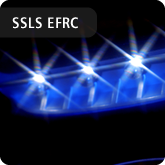Access to reliable, affordable, and sustainable sources of energy is essential for all modern economies. Since the late 1950s, we Americans have not been energy self-sufficient. Our addiction to foreign oil and fossil fuels puts our economy, our environment, and ultimately our national security at risk. Furthermore, there is a growing recognition of the requirement to balance our need for plentiful, low-cost energy, with an inherent responsibility to steward the natural environment. The U.S. does not face this challenge alone. As the world continues to become more connected, our collective futures are inextricably linked, and energy lies at the core of global interactions. Meeting our growing energy needs and how we manage the impacts on climate change will have profound ramifications on the global economy and ultimately on global geopolitical stability.
Sandia has a long history addressing the nation’s energy challenges, beginning in the 1970s when our nation initiated its push towards energy independence. In 2010, Sandia combined programs in energy, climate, and infrastructure to create a new strategic management unit (SMU) that better leverages and integrates these three interrelated missions. Today, Sandia science and engineering expertise derived from our nuclear weapons heritage supports programs in solar and wind power for electricity generation, combustion science, nuclear repository design, and others. In FY10, our programs totaled approximately $300M and include national and international activities supported by three federal agencies and industry.
The Energy, Climate, and Infrastructure Security (ECIS) SMU leads and manages this mission area. Our heritage as a national security laboratory brings a unique perspective to addressing the new challenges and opportunities outlined by President Obama and the current administration. “Each of us has a part to play in a new future that will benefit all of us. As we recover from this recession, the transition to clean energy has the potential to grow our economy and create millions of jobs—but only if we accelerate that transition.” (President Obama, June 15, 2010).
The ECIS Mission: To enhance the nation’s security and prosperity through sustainable, transformative approaches to our most challenging energy, climate, and infrastructure problems.
Addressing National Challenges
At the national, regional, and state level there is growing general consensus on the most significant problems and challenges to our national security in the energy, climate, and infrastructure areas. During our ECIS strategic-planning process, we reviewed these challenges and selected a set of 7 national-level problems across the energy, climate, and infrastructure sectors that reflect our priorities and guiding framework. These are
- Reduce our dependence on foreign oil
- Increase use of low carbon power generation
- Understand risks and enable mitigation of climate change impacts
- Provide the foundation for a global climate treaty
- Increase security and resiliency of the electrical grid and energy infrastructure
- Assure energy security for critical installations
- Strengthen the nation’s science and technology (S&T) base in energy, climate, and infrastructure
ECIS Strategy
The ECIS SMU strategy has been guided by two central concepts:
- Industry plays the leading role in providing and adopting new energy and climate technologies.
- Policy decisions at all levels of government are critical to drive the implementation of any new approaches to our nation’s energy, climate, and infrastructure security.
ECIS Has Four Program Areas:
 ECIS Highlights
ECIS Highlights













 RSS
RSS Google+
Google+ Twitter
Twitter Facebook
Facebook LinkedIn
LinkedIn YouTube
YouTube Flickr
Flickr